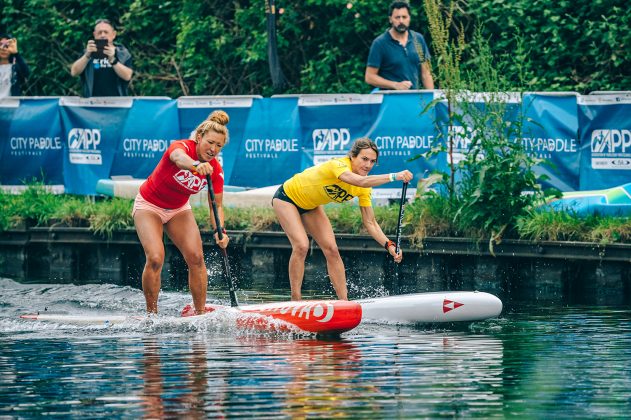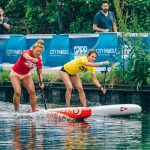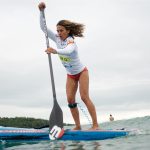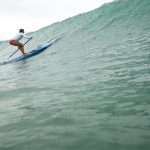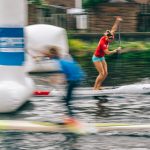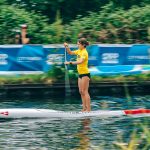INTERVIEW: GINNIE BETTS
I first met Ginnie on a sup instructor training course, though I knew her name from her victory at the 2016 Battle of the Thames. Two things were immediately apparent – firstly that Ginnie was a naturally rapid paddler, though she might deny that herself, and secondly that she was incredibly modest about her ability. See point one, QED. Since then we’ve paddled together, and crossed paths plenty of times and Ginnie is currently sitting 12th in the APP women’s overall race ranking, but I realised I still didn’t really know what had made Ginnie so quick. So, in between races and work, we caught up with Ginnie to find out the mindset, skillset and toolset behind her performance…
Wosson Ginnie, please tell us, where did it all begin?
I’m from West Cornwall and I live in Penzance. I was introduced to leisure paddling in autumn 2013 and pottered around St Michael’s Mount on an inflatable for most of 2014, but even then I’d always feel the need to push myself and figure out how to go faster. I stumbled across SUP racing by chance when a leg of the Eurotour was held in Carbis Bay, May 2015. I went to watch and was completely mesmerised. My immediate assumption was that I was too old to start, but I was convinced otherwise and since then competitive SUP racing has been my primary interest. That said, my other love is coastal ‘adventure’ paddling. Living in West Cornwall, with its stunning coastline, that love is inevitable.
And how does your event schedule look for the rest of the year?
I’m about to complete the US ‘hat trick’ of races having done the Pacific Paddle Games for the first time last October and the Carolina Cup in April, I’m now fortunate enough to go and race the iconic Gorge Paddle Challenge in Hood River, Oregon (August 17-19). Much like the PPG and Carolina, the Gorge is very much a ‘rite of passage’ for sup racers. If the wind plays ball, the Gorge provides some of the best down winding conditions in the world. My travel to Carolina and the Gorge was made possible by Barrachou Paddle who took a punt on sponsoring a slightly anomalous candidate. I’m very grateful.
I’ve qualified for the national team again this year, but we’re still waiting to hear whether the International Surfing Association is actually hosting a World Championships and whether it’s Home Nations or Team GB like last year. If ISA fails to come through I hope to head to either the World Cup in Scharbeutz or the International Canoe Federation World Championships in China… maybe both if I can come up with a hustle!
On the water when concentrating on stroke technique, what cues do you look out for?
Stroke technique is a lifelong learning project…I find it fascinating how the numerous variables of aligning, weighting and moving every single part of your body all interplay with the water state in that solitary second it takes to take a stroke. The more I paddle, the more I realise how much I don’t know – I’m not sure you ever ‘arrive’, but I can describe the cues I’m using at the current stage in my journey.
One of the key indicators that I’m not paddling well is feeling any pain in my shoulders, back or arms – the only place I want to feel any muscular discomfort are in my legs or my abs. I want to feel the sensation of falling onto the blade and yet doing so quietly, with no noise or splash. I want a positive angle on blade entry to the water. I want to ensure sufficient rotation at the set up (but not over-rotating , that’s a waste of energy), I want to ensure sufficient reach (but not over-reaching, again, a waste of energy). I want my core to be strongly engaged and I want to feel a smooth undulation in my upper back. I want my pelvis tucked and knees slightly bent to ensure adequate hip thrust and bring my legs into play. Most of all I want to feel that beautiful ‘flow state’ of connection with the water – that sense of harmony when engaged with its call and response to us. Those moments when your mind quietens, your body feels strong yet fluid and you are completely lost in the meditation of the stroke. Rare but beautiful!
Have you had any revelations in technique or approach lately?
I’ve learnt that sleep and nutrition matters (doh). This is a total no brainer to seasoned athletes, but I’m not one of those. To be honest I’ve been winging the training outside of caring for three kids and a full time job and I’m the sort of person who learns most of my lessons the hard way. I had three internationals and three domestic races this spring, along with a house move and starting a new job… short cuts were taken, particularly on sleep. Unsurprisingly my system crashed. What I previously viewed as ‘poncey athlete food’ is now making an appearance in my cupboard – spirulina and quinoa for tea, darling? I’m also being more disciplined on getting to bed at a decent hour. The house is messier but that’s a consequence I can live with. Just.
Talk us through your training schedule at home in Cornwall.
Last year I reached out to Seychelle (one of the top US competitors) to ask for help with structuring my training. Seychelle is one of the coaches on an online training platform called ‘Paddle Monster’, which I wholeheartedly recommend. I’m on her advanced programme which sets up to five different paddle sessions and three gym sessions a week. I have never had the time to complete all sessions in any given week; I pick and mix the sessions I know will be most beneficial for upcoming races and which work with whatever sea state conditions are presenting at the time. If the surf is looking ‘raceboard good’ at Sennen for example I’ll just tick that off as an ‘interval’ session. Or I’ll do my ‘long paddle’ as a downwind from Mousehole to Porthleven when there’s a good westerly. I try and make it fun when possible, although drills in the cold and dark in Penzance harbour are also a thing for me and regularly make me question my motivations!
My training happens either early morning prior to the kids waking or late at night post-bed time, weekends I have a little more flexibility when I can tag team on the childcare.
Can you also tell us about the kit you are using? (board, paddle, dimensions of both, any other accessories that are really helpful to you)
I’ve found a combination I’m really happy with in the form of the SIC RS (Rocket Ship) 14’ x 21.5 and my Black Project Fins and paddles. Both companies are based in Maui and both developed their product around the needs of ocean paddlers, which is probably why I gravitated to them. I love the RS because it’s versatile enough to work as an all-round board albeit not quite as fast as purpose designed flat water boards, but that is more compensated for by the joy it brings when out on the bumps and in the surf. With SIC you also become part of a strong, inclusive and fun international community who I love meeting up with at events.
Black Project paddles are my go-to because they combine power and efficiency with ergonomic considerations. The Black Project paddles are easier on the body compared to other paddles I’ve tried and despite being incredibly light, they are very robust. Black Project is one of the few companies that invites women to contribute to the design ideas. Olivia Piana was instrumental to the new Tex Carbon Hydro design that I use. It would be great for board companies to follow suit
You have a background in other sports, is that correct? If so, what are they, and do you feel that your sporting background has helped your sup performance?
My competitive sporting background ended when I was about 15. I trained as a gymnast as a child, and then I danced (non-competitively) in my teens and twenties. I had three children in my thirties and was pretty unfit when I first discovered SUP racing. Whilst I’m sure that dance and gymnastics has helped with my balance, I had no background in any serious athletic training or any other form of watersports – I am having to pick up that athletic knowledge and the water skills as I go along. No mean feat as a slightly ‘older’ mum athlete. My main advantage is the fact that I live in West Cornwall – getting out in all conditions has been the key factor in helping me to progress.
People that paddle with you know about your speed on the water, but have you noticed any raised eyebrows in any events you’ve been to overseas, where perhaps you were less known?
The PPG was a bit of a breakthrough moment for me, until then I had no idea I could even get close to some of the bigger names and getting a 9th place in the distance race at the ISA World’s 2018 is something I will always be proud of. I think people are most surprised at my age and the fact I’m a working mum of three, when most of my competitors are at least 10-25 years younger, with fewer responsibilities. This does mean I have to fly in and out to races very quickly without proper time to acclimatise or familiarise myself with the courses. This doesn’t lend itself well to race prep but you can’t have it all! I did fairly well at Carolina, London APP and Eurotour San Sebastian hovering just inside or outside of the top 10. What I’m most proud of is the fact I went after the opportunities regardless, and made it happen. Had you told me last year I was going to participate in these incredible races I would not have believed you.
For Brit racers who are yet to compete offshore, I’d thoroughly recommend it. Not only for the opportunity to bench mark yourself internationally but for the relationships and learning that comes from competing at this level. It’s a challenging, yet inclusive and friendly scene.
How do you see the health outlook for racing both in the UK, and overseas? Are events getting more numerous, better attended, or has it flatlined, or is it in contraction?
I’m only 4 years into the sport so don’t really have the same longitudinal perspective as more established UK paddlers. From my point of view, the UK paddling scene is in a very healthy state right now. This year’s GBSUP series has been brilliantly run and better attended than ever. It had a competitive yet supportive, inclusive feel about it. Internationally, I’m not even one year into that scene. What I have observed though are new areas of growth in nations like Brazil and Japan who are beginning to challenge the established hierarchy and I expect that to continue. Whilst the sport may reshape itself somewhat as international governance issues are worked through, the passion of the paddlers themselves, which I’ve observed in athletes form all nations now, is never going to die. SUP athletes who race for the right reasons, love the sport, love the water, love the community, and for that reason I believe the future is very positive.
For someone that can’t get to the water often but still would like to improve performance, can you suggest any cross training ideas that might help?
Basically if you follow the periodisation training principles over the athletic calendar year you can substitute some of your paddles with land based activities like running, swimming or cycling – most UK paddlers have no choice but to do so over the winter with lack of daylight before and after work. You can do targeted strength work for paddling (again the Paddle Monster App is great for this) year round. However, nothing substitutes developing good stroke technique, and the acquired proprioception which comes only from engaging with the water – so take every opportunity you can to challenge yourself in different conditions.
Finally, when you are in the finishing straight of a race and are having to dig deep into the reserves of fortitude, do you have any strategy, or mantra, or key words that help get you over the line?
I think I’ve still got a lot to learn in this regard. On distance races I just tend to ‘sink inside of myself’ – I’ve heard some call it the ‘pain cave’, that place where you learn to get comfortable being uncomfortable. I’m sure child birth has helped me out here! I still don’t think I’ve pushed myself to my max though and want to learn more about applying those ‘mind stronger than the body’ philosophies. I do shout at waves during technical races (!), I can get a bit intimidated in bigger surf and so find it helpful to have a few key words to shout as I’m punching out through the white water. SUP International

